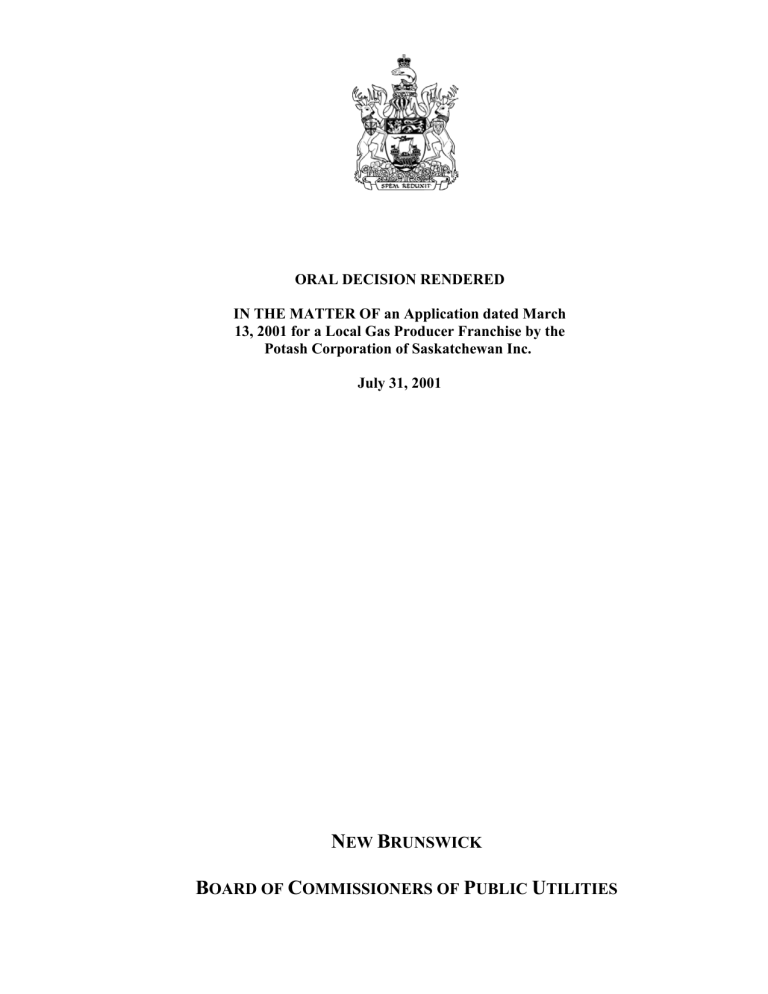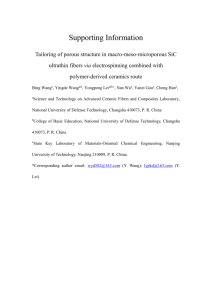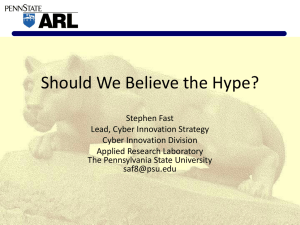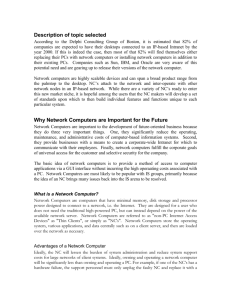PCS Local Gas Producer Franchise Jul 01

ORAL DECISION RENDERED
IN THE MATTER OF an Application dated March
13, 2001 for a Local Gas Producer Franchise by the
Potash Corporation of Saskatchewan Inc.
July 31, 2001
N
EW
B
RUNSWICK
B
OARD OF
C
OMMISSIONERS OF
P
UBLIC
U
TILITIES
THE NEW BRUNSWICK
BOARD OF COMMISSIONERS OF PUBLIC UTILITIES
The Potash Corporation of Saskatchewan Inc. (PCS), by letter dated March 8, 2001, applied to the Board of Commissioners of Public Utilities (the Board) for a Local Gas Producer Franchise (LGPF) solely for the purpose of allowing it to transport McCully natural gas to the PCS facility. The PCS facility is located in
Penobsquis, New Brunswick and is approximately two kilometres from the plant where the McCully gas is to be processed. PCS has stated that it does not plan to distribute gas to any other customers. PCS further stated that it does not want to serve any other customers and would only do so if ordered by the Board.
A public hearing to review the application was held on July 4-5, 2001. Enbridge Gas New Brunswick Inc.
(EGNB), the Province represented by the Department of Natural Resources and Energy (DNRE) and the
Union of New Brunswick Indians (UNBI) appeared as intervenors. UNBI, after confirming that its evidence was part of the official record, took no active part in the public hearing.
EGNB’s evidence stated that EGNB had determined that it would not oppose PCS’ application if there were proper safeguards that the existing PCS plant would effectively be and remain the only customer of the
PCS Franchise. DNRE stated that it had two interests. These were that the EGNB franchise be and remain healthy and secondly that the development of indigenous gas supplies be encouraged in New Brunswick..
The PCS application is similar in nature to a Single End Use Franchise (SEUF) in that the request is to allow for the provision of gas which is to be used by a single customer. However, as the PCS facility at
Penobsquis will not be receiving gas directly from a transmission line as required by the Gas Distribution
Act, 1999 (the Act), and therefore, PCS was unable to apply for a SEUF.
The PCS application is unique and does not fit the normal application for a public utility franchise.
Traditionally, an exclusive franchise area is granted to the public utility and the utility, in exchange, has an obligation to provide service to all customers within that franchise area. In this particular situation neither
PCS nor the intervenors want PCS to distribute gas to any customer other than the PCS facility at
Penobsquis. All parties do, however, want PCS to be able to use McCully gas at their Penobsquis facility.
The Board believes that the Legislature did not foresee an application such as this when it passed the Act.
The Board believes that the Act should be amended to provide for a new type of franchise to cover the situation where the producer wishes only to transport gas for consumption at its own facilities, which is the case with PCS.
PCS and EGNB have engaged in negotiations, over a period of several months, in an effort to determine a way in which EGNB could distribute McCully gas to the PCS facility at Penobsquis. The Board had hoped that an agreement could have been reached which would have satisfied all parties and removed the need for PCS’s application. However, the parties did not and the Board must fulfill its duty under the Act.
The Board considers that in the absence of an agreement with EGNB and without a LGPF that PCS would be unable to use McCully gas at its Penobsquis facility. This would prevent PCS from realizing the reduction in operating costs that it expects to receive from the utilization of natural gas. Such a
- 1 -
K:\Official Documents\Decisions\NG\Oral Decision Potash July'01.doc
development could have a serious negative impact on the exploration and production of New Brunswick indigenous gas.
The natural gas market in New Brunswick is in its early years of development. Parties involved must be able to adapt as circumstances require. This means that there should be the flexibility necessary to provide solutions that are in the public interest. The Act gives the Board the authority to grant a LGPF where it is satisfied that to do so would not materially prejudice the customers of EGNB. The Act also gives the Board the power to grant a LGPF on such terms and conditions as the Board finds necessary in the public interest. The Board believes that there would be no prejudice to the customers of EGNB if the proper conditions are attached to the grant. The Board, therefore, finds it to be in the public interest to grant a
LGPF to PCS with specific conditions to reflect the special circumstances. The Board believes that the conditions will provide appropriate protection to EGNB, while at the same time encouraging the development and use of indigenous natural gas.
The question arose, during the public hearing, as to whether “gathering lines” should be a part of the franchise area. The piping which transports raw gas to a central processing facility was referred to as
“gathering lines”. The Act does not define “gathering lines”. The Board directed DNRE, EGNB and PCS to provide written submissions on the question. The three parties were given an opportunity to respond to the submissions of the other parties. DNRE, EGNB and PCS provided submissions and comments on the submissions of the others.
PCS stated, in part, that “gathering lines” are not part of a franchise area and provided the following rationale. The franchise area is an area in which a gas distributor distributes gas to a customer who is a consumer of gas. Further, that “gathering lines” transport raw, unusable gas. PCS stated that it does not make sense that a distribution company should have an obligation to distribute other than usable gas to a customer. Therefore, the “gathering lines”, which transport raw unusable gas, are not capable of forming part of a franchise.
EGNB stated that the “gathering lines” should not be included in the franchise area and provided the following rationale. A gas distributor operates a gas distribution system and that a gas distribution system may be defined as part of a gas pipeline. However, the system must also distribute gas to a building where it is used by a customer. “Gathering lines” are not used to distribute gas to a building for use by a customer and therefore should not be part of the franchise area.
DNRE stated that all areas where gas will be collected by “gathering lines” must be included in the franchise area. This conclusion was based on the definitions of “pipeline”, “works”, “gas”, “transport” and
“distribute” in the Act. The Province maintained that a gas distribution system includes all of the pipeline.
Further, they state that a gas processing facility, which refines raw gas, is defined under “works” and is a part of the distribution system. DNRE concluded that gas is transported from the wells via the “gathering lines” to the processing facility and through the distribution pipe up to and including the gas meter at the
PCS facility and it is this complete system which is covered by the definition of a pipeline under the Act.
This interpretation would create an anomalous situation where, if a local provider were to interconnect with
EGNB, it could have “gathering lines” which would not fall under the regulatory jurisdiction of this Board and also not under the authority of the Minister under the Oil and Natural Gas Act, S.N.B.
- 2 -
K:\Official Documents\Decisions\NG\Oral Decision Potash July'01.doc
DNRE further stated that the Province was presently considering whether to seek amendments to the Act to remove “gathering lines” from the definition of “pipelines” and also whether to seek amendments to the
Oil and Natural Gas Act, S.N.B. which would provide the Minister with clear regulatory authority over
“gathering lines”.
While the positions taken by both the applicant and EGNB would produce a result that would provide a practical solution and a fair and reasonable one in the present application, we cannot ignore the provisions of the Act and must concur with the Province’s interpretation of the governing legislation. We therefore strongly urge the Province to amend the Act and the Oil and Natural Gas Act, S.N.B. so that “gathering lines” will be removed from the definition of “pipeline” and the Minister will, pursuant to the Oil and Natural
Gas Act, clearly have regulatory authority over them.
We realize that this interpretation of the legislation and the obvious result that the Board must define the area of the franchise by a metes and bounds description, including the “gathering lines” will require a much larger franchise area than if “gathering lines” were not included.
It is this Board’s intention through the conditions that it will attach to the grant of the franchise to make it possible for the Board to revisit the description of the franchise area if the legislature does amend the Act to remove “gathering lines” from the provisions of the Act.
If the Board is not successful legally in doing this, we would suggest that the legislature consider an additional amendment to allow us to revisit the franchise description. If, of course, the original suggestion that a new type of franchise be included in the Act and the condition that this LPGF expires with the applicant receiving that new type of franchise, then it will not be necessary to revisit the metes and bounds description. The grant of the Local Gas Producer Franchise to the applicant shall be subject to the following conditions:
1. PCS is authorized and required to distribute gas to one and only one location. That location is the PCS facility at Penobsquis.
2. PCS is not permitted to distribute gas to any other location or customer. If any person has made arrangements for a supply of natural gas and wishes to have PCS transport it, the following procedure must be observed. a.
PCS is to notify the person that they are a potential customer of EGNB and also to notify EGNB and the Board of the request for service. b.
PCS and EGNB are then to enter into negotiations regarding the way in which
EGNB can connect to the PCS gas distribution system in order to provide service
to the person involved.
c.
If EGNB does not believe that it would be economically feasible for the person to
receive service EGNB shall apply to the Board for the appropriate order. d.
If EGNB considers that it would be feasible to provide service and cannot reach
agreement with PCS the matter is to be referred to the Board for resolution.
- 3 -
K:\Official Documents\Decisions\NG\Oral Decision Potash July'01.doc
3. The geographic area of the franchise includes the “gathering lines”, the gas processing plant, and the pipeline from the processing plant up to and including the gas meter at the PCS facility at Penobsquis. The particular metes and bounds description for the franchise area is as presented in Description 2 which was attached to the PCS submission of July 21, 2001.
4. PCS must include the “gathering lines” as part of its application for a permit to construct.
5.The Board shall revoke this Local Gas Producer Franchise if PCS receives a new type of franchise as a result of amendments to the Gas Distribution Act, 1999.
6. In the event that “gathering lines” are removed from the Board’s regulatory jurisdiction under theGas Distribution Act, 1999 pursuant to an amendment to that Act, the Board will review and may change the “franchise area” defined in this decision.
The franchise will be granted as soon as Board staff is provided with documentation which clearly establishes PCS’ right to remove gas from a well in New Brunswick. The Board considers that these conditions define a franchise which is appropriate in the circumstances. PCS has an exclusive franchise to distribute gas to its facility at Penobsquis. PCS, in turn, has an obligation to provide service to itself and an obligation to provide any necessary connections to EGNB.
The Board does not consider that the specific use which may be made of gas by the facility at Penobsquis is an appropriate matter for it to decide. The Board believes that customers should be able to use gas in any manner as long as it complies with legal and safety requirements.
The term of the franchise will be twenty years. If a situation arises where no gas is available and there is no likelihood of finding more McCully gas, then PCS should apply to the Board to abandon the pipeline.
DELIVERED AT THE CITY OF SAINT JOHN, NB this 30 th day of July, 2001.
K:\Official Documents\Decisions\NG\Oral Decision Potash July'01.doc
- 4 -
Per Lorraine Légère
Secretary of the Board








